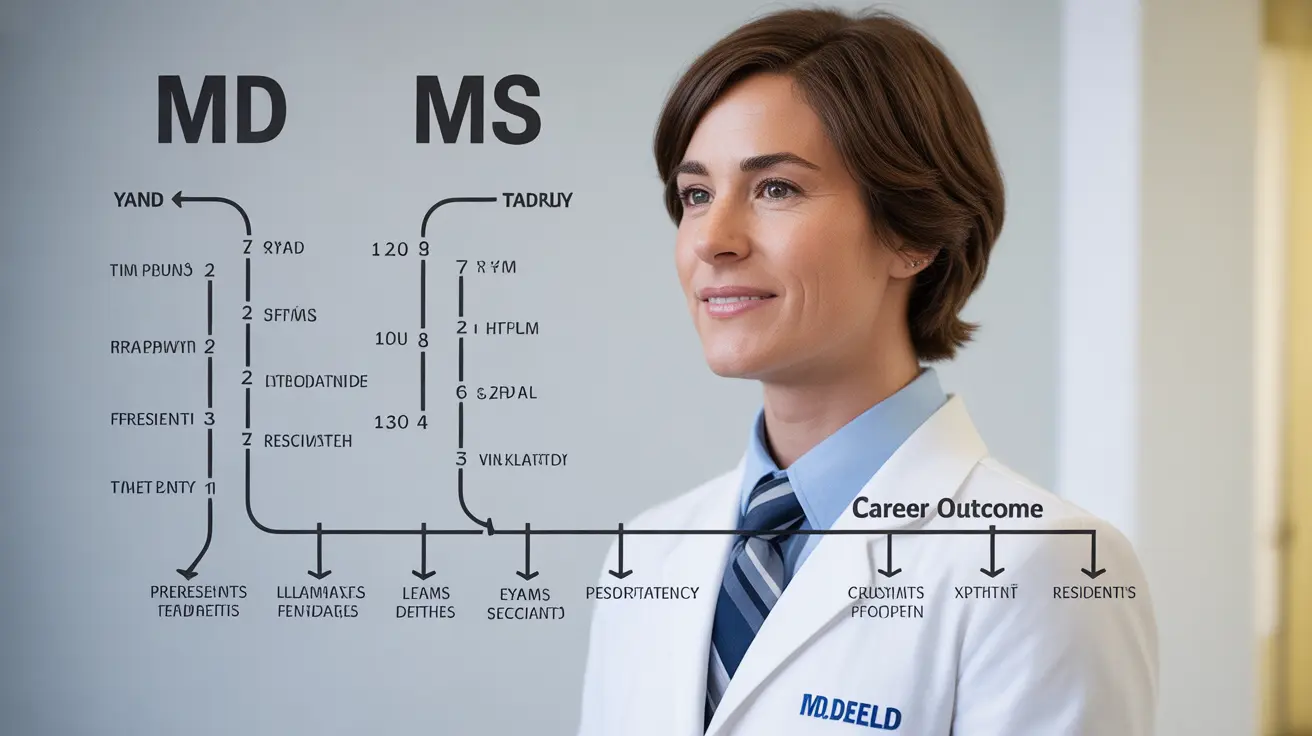When exploring advanced degrees in healthcare and medicine, two common options you'll encounter are the MS (Master of Science) and MD (Doctor of Medicine) degrees. While both play crucial roles in advancing healthcare and medical knowledge, they serve distinctly different purposes and lead to varying career paths. Understanding these differences is essential for making informed decisions about your medical education and career trajectory.
This comprehensive guide will explore the fundamental distinctions between MS and MD degrees, including their educational requirements, career opportunities, and roles in healthcare delivery.
Educational Requirements and Duration
The path to earning an MD versus an MS degree differs significantly in both length and focus of study:
MD Program Structure
To become a medical doctor (MD), candidates must complete:
- 4 years of undergraduate education (pre-med)
- 4 years of medical school
- 3-7 years of residency
- Optional fellowship training (1-3 years)
MS Program Structure
For a Master of Science degree, students typically complete:
- 4 years of undergraduate education
- 2-3 years of graduate studies
- Optional research or practical experience components
Scope of Practice and Authority
One of the most significant differences between these degrees lies in their scope of practice and clinical authority:
MD Practice Rights
Medical doctors (MDs) have the authority to:
- Diagnose and treat medical conditions
- Prescribe medications
- Perform medical procedures
- Order and interpret diagnostic tests
- Provide direct patient care
MS Role Limitations
MS degree holders typically:
- Cannot independently practice medicine
- Focus on research, education, or specialized healthcare roles
- May work alongside physicians in supporting roles
- Contribute to medical research and advancement
Career Opportunities and Specializations
Both degrees offer diverse career paths within healthcare, though in different capacities:
MD Career Paths
Medical doctors can pursue careers as:
- Primary care physicians
- Specialists (e.g., cardiologists, surgeons)
- Hospital administrators
- Clinical researchers
- Medical educators
MS Career Options
MS degree holders often work in:
- Medical research
- Healthcare administration
- Public health
- Biotechnology
- Health education
- Clinical laboratory management
International Variations
The distinction between MS and MD degrees can vary internationally. Some countries utilize different systems for medical education and certification, affecting how these degrees are awarded and recognized globally.
Frequently Asked Questions
What is the main difference between an MD and an MS degree in healthcare?
The primary difference is that an MD is a professional doctorate that enables clinical practice as a physician, while an MS is a graduate-level degree focusing on research, specialized knowledge, or technical expertise in specific healthcare areas. MDs can diagnose and treat patients independently, while MS holders typically work in non-clinical or supporting roles.
Can someone with a Master of Science (MS) degree practice medicine or treat patients?
No, an MS degree alone does not qualify someone to practice medicine or treat patients independently. Only licensed medical doctors (MDs) and other specific healthcare professionals (like nurse practitioners under certain conditions) can legally diagnose and treat patients.
How long does it take to complete an MD compared to an MS, and what does each program involve?
An MD typically requires 8 years of education (4 years undergraduate + 4 years medical school) plus 3-7 years of residency. An MS usually takes 2-3 years after completing a bachelor's degree. MD programs focus on clinical medicine, while MS programs emphasize research, specialized knowledge, or technical expertise in specific areas.
What career options are available for MD graduates versus MS graduates in the medical and health fields?
MD graduates primarily work as practicing physicians in various specialties, while MS graduates typically pursue careers in research, healthcare administration, public health, biotechnology, or specialized technical roles in healthcare settings.
Why do some countries award an MD as a research doctorate rather than a clinical medical degree?
Different countries have varying educational systems and professional requirements. In some countries, particularly in Europe, the medical degree is awarded as a combined undergraduate/graduate degree, while an MD might be awarded as a research doctorate similar to a Ph.D. This reflects different approaches to medical education and professional certification internationally.




